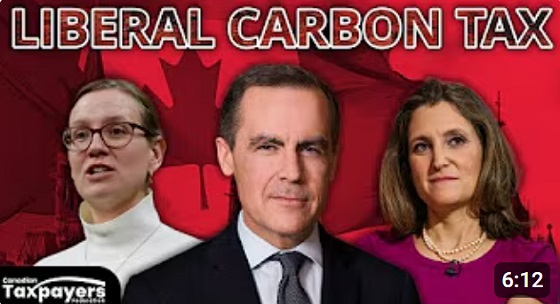Business
Not a ‘vibecession’—Canadian living standards are declining

From the Fraser Institute
By Grady Munro
In June 2019, inflation-adjusted per-person GDP was $59,905 compared to $58,601 in September 2024, a decline of 2.2 per cent. And while per-person GDP has ebbed and flowed during this decline, the third quarter of 2024 marks the sixth consecutive quarter that living standards have fallen in Canada.
During a recent press conference about the Trudeau government’s plan to send $250 cheques to many Canadians and suspend the GST on certain goods and services for two months, federal Finance Minister Chrystia Freeland said Canadians are experiencing a “vibecession,” which is creating negative feelings about the economy despite “really positive economic news.” According to Freeland, these two proposals, which will cost billions, will “help Canadians get past that vibecession.”
But in reality, the economic woes of Canadians are real, and new data from Statistics Canada show that Canadian living standards are declining.
Let’s look at the numbers. From July to September of 2024, after adjusting for inflation, the Canadian economy (as measured by GDP) grew by 0.3 per cent yet per-person GDP (an indicator of living standards and incomes) actually fell by 0.4 per cent.
How can the economy grow while living standards decline?
Because Canada’s rapid population growth, fuelled by high levels of immigration, means the overall economy has increased in size but per-person GDP has not. And during the same three-month period (July to September), Canada’s population increased by 0.6 per cent (or 250,229 people), outpacing the rate of economic growth.
Not merely a one-off, this continues a historic decline in Canadian living standards over the last five years. In June 2019, inflation-adjusted per-person GDP was $59,905 compared to $58,601 in September 2024, a decline of 2.2 per cent. And while per-person GDP has ebbed and flowed during this decline, the third quarter of 2024 marks the sixth consecutive quarter that living standards have fallen in Canada.
Last week, the House of Commons approved the government’s plan to temporarily suspend the GST on select items from December 14 to February 15, at an estimated cost of $1.6 billion (the legislation now goes to the Senate for approval). The government has delayed the “$250 cheques” plan to potentially accommodate NDP demands to expand eligibility to include seniors (the original proposal would have sent cheques to an estimated 18.7 million Canadians at a cost of $4.7 billion).
Neither one of these proposals will incentivize Canadians to work and invest, and therefore these proposals won’t help raise living standards. To help drive economic growth, create jobs and provide more economic opportunities for workers across the income spectrum, the federal government should reduce the overall tax burden on workers and businesses, and make Canada a more attractive place to work and invest.
Despite any claims of a “vibecession,” Canadians remain mired in an actual recession in their standard of living. Minister Freeland’s comments once again prove that this government is disconnected from the reality many Canadians face. It’s not just bad vibes—data shows Canadians are actually worse off today than they were in 2019.
2025 Federal Election
MEI-Ipsos poll: 56 per cent of Canadians support increasing access to non-governmental healthcare providers

-
Most believe private providers can deliver services faster than government-run hospitals
-
77 per cent of Canadians say their provincial healthcare system is too bureaucratic
Canadians are increasingly in favour of breaking the government monopoly over health care by opening the door to independent providers and cross-border treatments, an MEI-Ipsos poll has revealed.
“Canadians from coast to coast are signalling they want to see more involvement from independent health providers in our health system,” explains Emmanuelle B. Faubert, economist at the MEI. “They understand that universal access doesn’t mean government-run, and that consistent failures to deliver timely care in government hospitals are a feature of the current system.”
Support for independent health care is on the rise, with 56 per cent of respondents in favour of allowing patients to access services provided by independent health entrepreneurs. Only 25 per cent oppose this.
In Quebec, support is especially strong, with 68 per cent endorsing this change.
Favourable views of accessing care through a mixed system are widespread, with three quarters of respondents stating that private entrepreneurs can deliver healthcare services faster than hospitals managed by the government. This is up four percentage points from last year.
Countries like Sweden and France combine universal coverage with independent providers and deliver faster, more accessible care. When informed about how these health systems run, nearly two in three Canadians favour adopting such models.
The poll also finds that 73 per cent of Canadians support allowing patients to receive treatment abroad with provincial coverage, which could help reduce long wait times at home.
Common in the European Union, this “cross-border directive” enabled 450,000 patients to access elective surgeries in 2022, with costs reimbursed as if they had been treated in their home country.
There’s a growing consensus that provincial healthcare systems are overly bureaucratic, with the strongest agreement in Alberta, B.C., and Quebec. The proportion of Canadians holding this view has risen by 16 percentage points since 2020.
Nor do Canadians see more spending as being a solution: over half say the current pace of healthcare spending in their province is unsustainable.
“Governments shouldn’t keep doubling down on what isn’t working. Instead, they should look at what works abroad,” says Ms. Faubert. “Canadians have made it clear they want to shift gears; now it’s up to policymakers to show they’re listening.”
A sample of 1,164 Canadians aged 18 and older was polled between March 24th and March 28th, 2025. The margin of error is ±3.3 percentage points, 19 times out of 20.
The results of the MEI-Ipsos poll are available here.
* * *
The MEI is an independent public policy think tank with offices in Montreal, Ottawa, and Calgary. Through its publications, media appearances, and advisory services to policymakers, the MEI stimulates public policy debate and reforms based on sound economics and entrepreneurship.
2025 Federal Election
POLL: Canadians say industrial carbon tax makes life more expensive

The Canadian Taxpayers Federation released Leger polling showing 70 per cent of Canadians believe businesses pass on most or some of the cost of the industrial carbon tax to consumers. Meanwhile, just nine per cent believe businesses pay most of the cost.
“The poll shows Canadians understand that a carbon tax on business is a carbon tax on Canadians that makes life more expensive,” said Franco Terrazzano, CTF Federal Director. “Only nine per cent of Canadians believe Liberal Leader Mark Carney’s claim that businesses will pay most of the cost of his carbon tax.
“Canadians have a simple question for Carney: How much will your carbon tax cost?”
The federal government currently imposes an industrial carbon tax on oil and gas, steel and fertilizer businesses, among others.
Carney said he would “improve and tighten” the industrial carbon tax and extend the “framework to 2035.” Carney also said that by “changing the carbon tax … We are making the large companies pay for everybody.”
The Leger poll asked Canadians who they think ultimately pays the industrial carbon tax. Results of the poll show:
- 44 per cent say most of the cost is passed on to consumers
- 26 per cent say some of the cost is passed on to consumers
- 9 per cent say businesses pay most of the cost
- 21 per cent don’t know
Among those decided on the issue, 89 per cent of Canadians say businesses pass on most or some of the cost to consumers.
“Carbon taxes on refineries make gas more expensive, carbon taxes on utilities make home heating more expensive and carbon taxes on fertilizer plants increase costs for farmers and that makes groceries more expensive,” Terrazzano said. “A carbon tax on business will push our entrepreneurs to cut production in Canada and increase production south of the border and that means higher prices and fewer jobs for Canadians.”
-

 2025 Federal Election2 days ago
2025 Federal Election2 days agoNo Matter The Winner – My Canada Is Gone
-

 2025 Federal Election2 days ago
2025 Federal Election2 days agoASK YOURSELF! – Can Canada Endure, or Afford the Economic Stagnation of Carney’s Costly Climate Vision?
-

 Alberta2 days ago
Alberta2 days agoMade in Alberta! Province makes it easier to support local products with Buy Local program
-

 2025 Federal Election2 days ago
2025 Federal Election2 days agoCSIS Warned Beijing Would Brand Conservatives as Trumpian. Now Carney’s Campaign Is Doing It.
-

 Alberta2 days ago
Alberta2 days agoProvince to expand services provided by Alberta Sheriffs: New policing option for municipalities
-

 2025 Federal Election2 days ago
2025 Federal Election2 days agoInside Buttongate: How the Liberal Swamp Tried to Smear the Conservative Movement — and Got Exposed
-

 Bruce Dowbiggin1 day ago
Bruce Dowbiggin1 day agoIs HNIC Ready For The Winnipeg Jets To Be Canada’s Heroes?
-

 COVID-191 day ago
COVID-191 day agoCOVID virus, vaccines are driving explosion in cancer, billionaire scientist tells Tucker Carlson








